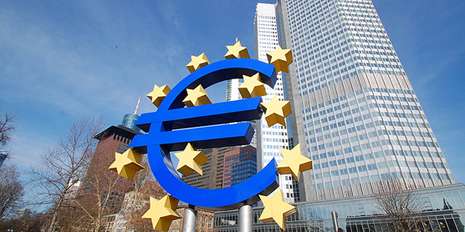Mario Draghi, ECB president, unveiled his staff’s projections for inflation and growth shortly after 1.30pm BST at the central bank’s regular post-meeting press conference.
It revised up slightly its forecast for inflation this year while its expectations for growth in 2017 were slightly lower.
The latest forecasts show inflation at 0.3 per cent this year, 1.5 per cent in 2016, and 1.8 per cent the following year. Meanwhile, growth is expected to hit 1.5 per cent this year, before rising to 1.9 per cent in 2016 and 2 per cent in 2017.
Headline inflation rose to 0.3 per cent in the year to May, according to data published on Tuesday, following no change in prices in the year to April. The core measure, which strips out oil and food prices, increased from a record low of 0.6 per cent to 0.9 per cent.
The reason for the weaker growth figures was a slowdown in trade caused by a drop in demand in emerging market economies.
However, signs that the threat of a serious bout of deflation is receding are yet to affect the ECB’s plans to buy €60bn of bonds a month until September 2016. Under its quantitative easing programme, eurozone central bankers plan to buy a total of €1.1tn of sovereign bonds and private sector debt.
The ECB president on Wednesday signalled the governing council had every intention of keeping to that, saying that planning exit strategies was a “really high-class problem.”
“We’re really far from that, so we are not discussing anything about that,” Mr Draghi said.
The ECB targets inflation of below but close to 2 per cent.
Meanwhile, unemployment fell slightly to 11.1 per cent in April, from 11.2 per cent in March. The number of unemployed in the single currency area fell to 17.85m, with 300,000 people having found work over the period.
National rates ranged from 4.7 per cent in Germany to 25.4 per cent in Greece, according to Eurostat, the commission’s statistics bureau.
There is evidence that eurozone consumers are finally opening their wallets. The volume of retail sales rose 0.7 per cent in the eurozone in April, following a decline of 0.6 per cent in March, according to official figures.
Separately, the final figure for the purchasing managers’ index, compiled by data provider Markit, was 53.6 – slightly higher than the initial estimate of 53.4 and well above the crucial 50 level that marks an expansion in manufacturing and service sectors’ activity.
More about:
















































